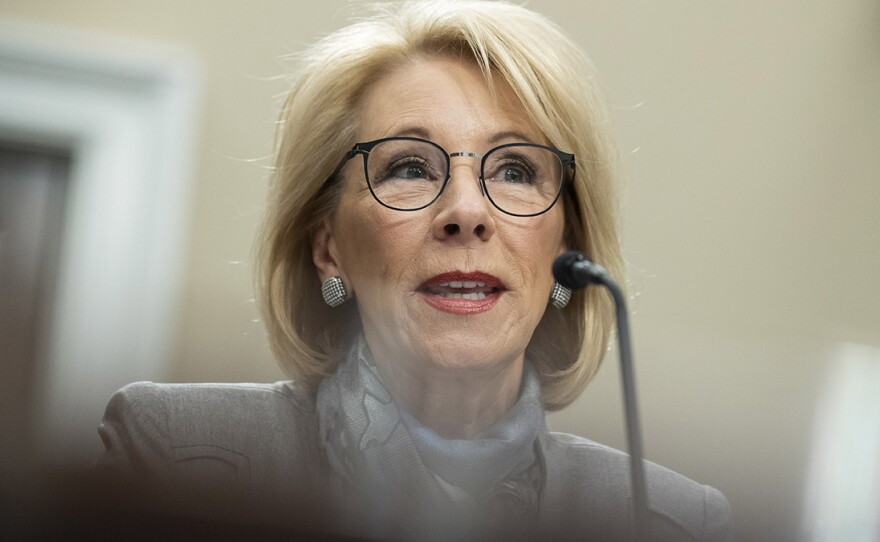School closures in San Diego County caused by the coronavirus pandemic have left thousands of students with disabilities without routine services and therapies, a disruption that parents say will likely lead to academic, behavioral and social regression.
School districts across the county are scrambling to set up distance learning, but for students in special education, school is more than the content they learn. The classroom provides needed structure to their lives.
“Our kids in special ed really rely on the predictability, on the consistency and the routine of a given school day and of the whole structure of school,” said Chris Brum, a professor of special education at San Diego State University. “That alone makes school closures really disruptive.”
Additionally, the suspending of core services like speech and occupational therapy has halted students’ progress. This has been particularly hard for Cameron, a five-year-old in the Poway Unified School District who is on the autism spectrum.
“He was putting two-word utterances together. He’s starting to put three to four-word utterances, getting used to the routine of school,” said Sahar Shefa, Cameron’s mom. “He started getting toilet trained at school, which was completely shocking because that’s something he does not do at home at all.”
Before Poway Unified closed schools to thwart the spread of the coronavirus, Cameron was receiving occupational and speech therapy several times a week. Now he’s getting none.
“With a child with special needs, as with any child, you’re afraid of regression, right?” Shefa said. “But with a child with special needs, once they regress, getting them back to where they were takes a much, much longer period.”
The school closures are also taking a psychological toll on parents.
“Being a special needs parent is already very isolating. You already feel like you’re the only one in the world going through this situation,” said Leticia Avelar, a parent of two sons on the autism spectrum. “When you add a quarantine to that, it becomes very difficult and very tiring.”
Luckily, Avelar has experience as a teacher's aide in special education. She’s currently working on a teaching credential. But other parents are struggling to fill the role of an educator.
“Just trying to create order here is just a little difficult as well,” said Christian Sanchez, a father of five, two of whom have disabilities. “We’re just trying to stay in communication with the school offices, so we don’t get lost between the cracks,” Sanchez said.
Serving students with disabilities presents both logistical and legal challenges for school districts that need to navigate federal disability laws to ensure there is equity in how all students are being served while schools are closed.
In a statement on Saturday, the U.S. Department of Education provided some wiggle room for local districts.
“We remind schools they should not opt to close or decline to provide distance instruction, at the expense of students, to address matters pertaining to services for students with disabilities,” the statement read. “Rather, school systems must make local decisions that take into consideration the health, safety, and well-being of all their students and staff,” the statement read.

The most recent version of the $2-trillion federal aid package being negotiated in Washington D.C. includes a provision that gives U.S. Education Secretary Betsy DeVos 30 days to provide recommendations on waiving the Individuals with Disabilities Education Act, a 1975 law that guarantees special education services in public schools.
At the state level, the California Department of Education issued guidance on Friday giving school districts control over special education during school closures. But according to the state, districts using distance learning “must ensure that students with disabilities have equitable access to comparable opportunities, appropriately tailored to the individualized need of a student to ensure meaningful access, as determined through the IEP process to the extent feasible.”
The San Diego County Office of Education elaborated that to the best of their capabilities, local districts are committed to serving their students with special needs. But services that require one-on-one meetings with speech or behavioral therapists will be assessed on a case-by-case basis.
“We will look at the different services that students have and make individual determinations about what is safe, what is feasible and what would be meaningful,” said Cara Schukoske, executive director of special education at the San Diego County Office of Education. “The response from the 42 districts in San Diego County has overwhelmingly been, ‘We want to serve students.’”
While districts design their special education plans, experts say parents should use vetted resources from school districts or universities to keep their children occupied with goal-oriented activities like researching topics of interest and presenting their findings on posters. Parents should also try to keep in touch with teachers and build off skills that students were working on before schools closed.
“It’s really hard for parents because they don’t have the resources we have in schools,” Brum said. “The first thing is relax a little bit. Don’t feel like you have to take the place of the teacher, but there are things you could be doing at home.”
In Poway, Shefa, Cameron’s mom, said it’s hard to relax when her son is in limbo.
“It scares me a lot because my son, like I said, he’s just breaking through to becoming verbal. He’s right on that cusp,” Shefa said. “Hopefully we’ll do everything we can, but I can’t predict anything.”







